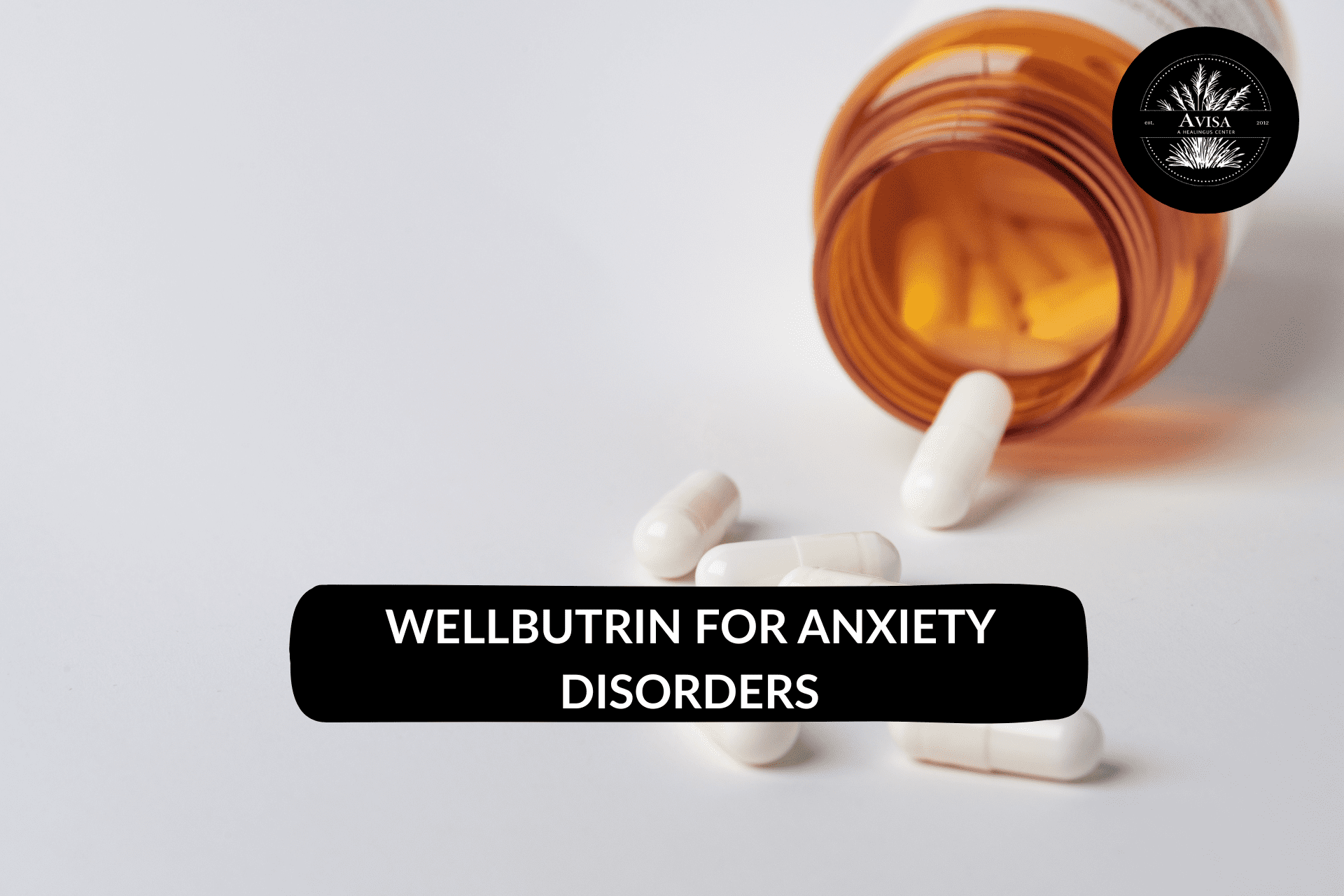This combination of acceptance and commitment therapy for anxiety disorder marks an important aspect of this blog where we are going to deep dive into the realm of anxiety and how ACT has proved to be a savior.
We are living in a big dream era, where the growing responsibilities and life challenges have made anxiety a regular acquaintance at our door. As per the World Health Organization, anxiety is the world’s most common mental disorder, affecting 301 million people in 2019. This disorder condition might appear common and harmless but it has immense power to affect your mental well-being. Before this condition of anxiety overpowers your conscious self, you need to take charge of your mind and emotions.
In this blog, we’ll explore the power of Acceptance and Commitment Therapy (ACT) as a tool to combat anxiety. Keep reading until the end to uncover the secrets to a calmer, more resilient life through the principles of acceptance and commitment therapy anxiety.
Anxiety keeping you from living fully?
What is Acceptance and Commitment therapy?
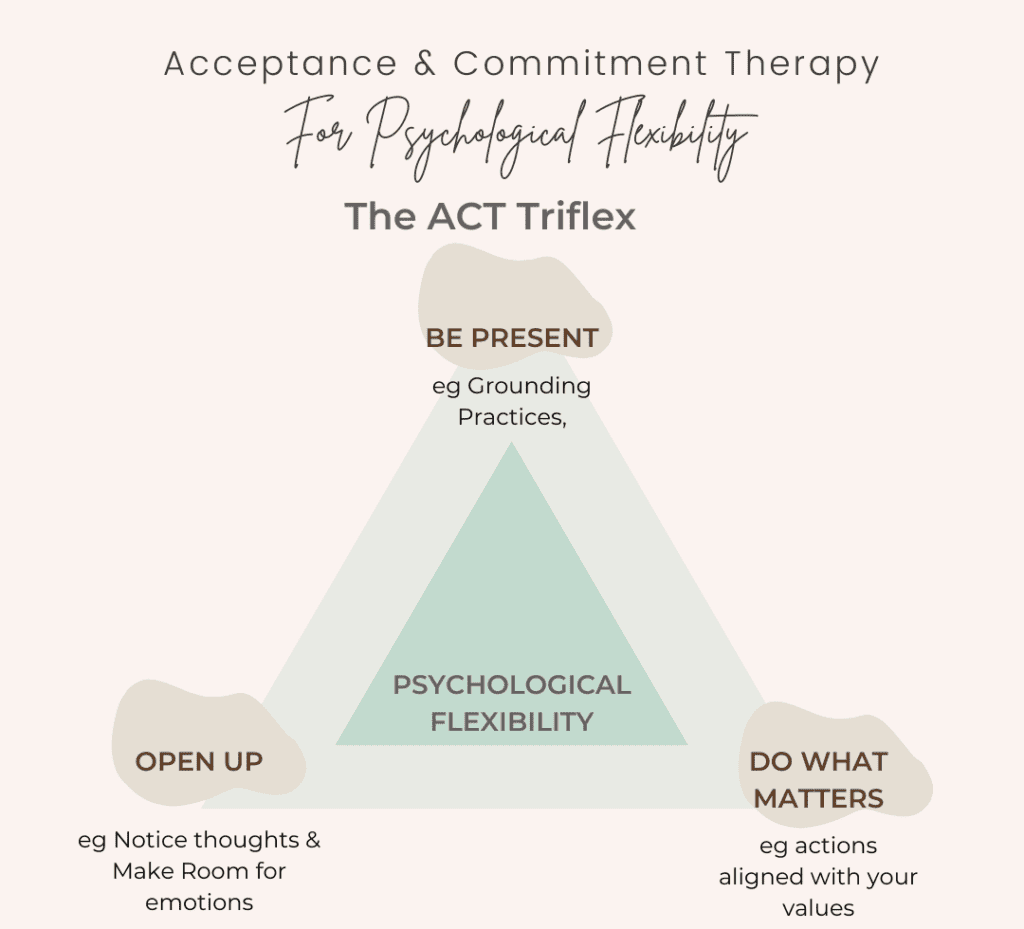
Acceptance and Commitment therapy anxiety comes as a lifeline for people who are trapped in a cycle of negative, destructive thinking. This therapy helps you to embrace and commit to your anxious self, rather than denying and resisting its presence. It works for people who suffer from multiple anxiety disorders. ACT helps you to embrace your imperfections and positively deal with them, rather than letting them destroy your mental peace. ACT has also been found to be effective in treating a wide range of mental health conditions, such as anxiety, depression, and stress, as well as chronic pain. Where GAD (Generalized Anxiety Disorder) drowns you in a sea of self-pitying doubts and fears, ACT acts as a life jacket helping you to survive.
Acceptance and Commitment Therapy Anxiety– How it Works, Techniques & Effectiveness
There are many techniques developed specifically for people with this disorder that can help them get rid of anxiety with ease. By selecting the correct techniques of ACT therapy, you can develop the ability to respond more flexibly to anxiety.
1. Acceptance, Mindfulness and Defusion
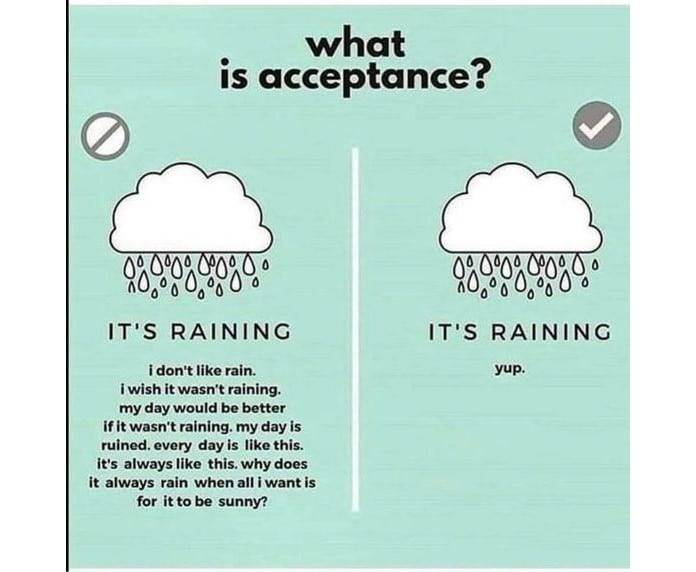
This method encourages you to acknowledge your anxious feelings and thoughts without judgment or resistance. By separating yourself from your negative thoughts and feelings, you will gain a deeper understanding of yourself. Accepting that your anxiety is an unavoidable part of life and doesn’t define who you are will help you heal quickly. According to studies by NCBI, mindfulness practices and therapies such as meditation and sensory listening play a significant role in reducing anxiety.
2. Values Identification & Committing to Action
To maximize the benefits of Acceptance and commitment therapy anxiety, you must first Identify what is important to you in life. Once you’ve identified your life’s meaning and goals, you’ll get clarity on the actions you need to take to fulfill those goals. This clearer perspective will help you get out of a rut that often leads to anxiety and health issues.
3. Creative Helplessness
Creative helplessness means accepting your ineffectiveness with a positive attitude. Once you accept your ineffectiveness in these situations with a sense of positivity and confidence, you will learn to live gracefully. Creative Ineffectiveness helps in managing anxiety, which often leads to self-pity and resentment.
4. Self as Context
The self-text technique aims to help you see yourself in a different light and to see the drama of your lives from the perspective of a third person. Once you remove the actor’s Prada from your body and sit in the spectator’s seat, you will begin to see yourself more clearly. This will allow you to be more patient with your feelings and less likely to react to them.
5. ACT Metaphors
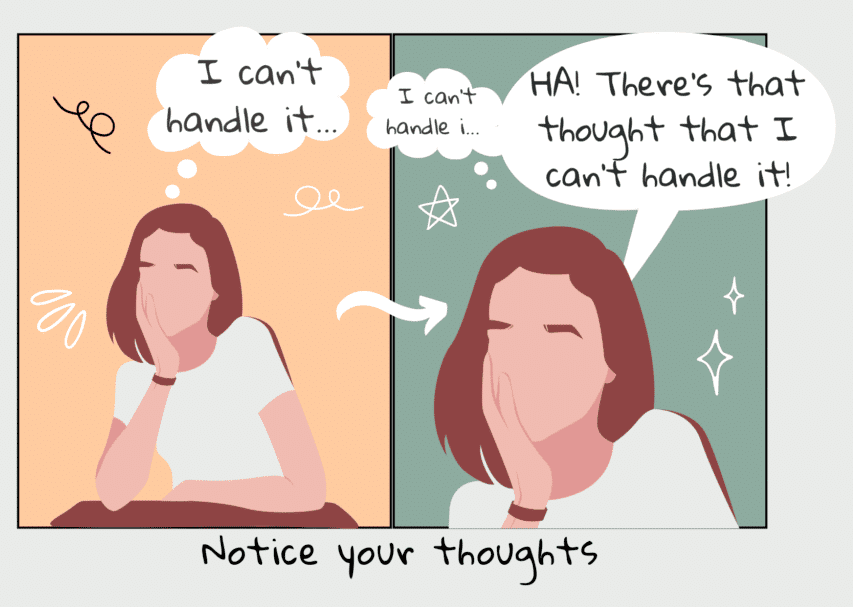
Neuroscientific research shows that metaphors engage us more emotionally than literal expressions, resulting in stronger activation of brain structures associated with processing emotional stimuli during anxiety. It creates a new sympathetic version of your anxious self that allows you to detach from your anxiety. Once you start to see your emotions as personalities, you start to see them for what they are and laugh at their absurdity.
Effectiveness of Acceptance and Commitment Therapy Anxiety
In an NCBI study, participants who had been referred to a private practice for 3 consecutive referrals for anxiety disorders received 10 sessions of ACT and showed clinically significant improvement in the severity of their anxiety disorders from pre-treatment to post-treatment. The ACT method of therapy transforms one’s state of mind from avoidance to acceptance. Instead of being critical towards themselves, a person learns to understand their situation and deal with it maturely. In practice, it has also been effective in reducing panic attack frequency, intensity and other panic symptoms.
Comparative Effectiveness of Acceptance and Commitment Therapy Anxiety
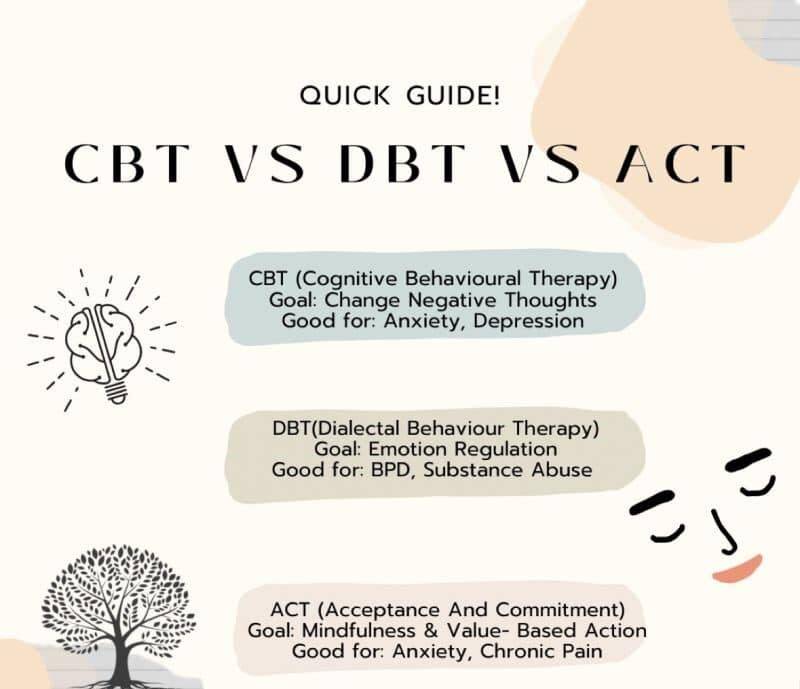
ACT versus CBT
ACT promotes acceptance and resolution of anxious thoughts and emotions. CBT uses a variety of cognitive strategies to help a person transform their negative thinking habits and behaviors. Studies by Researchgate have shown that both strategies are effective in reducing anxiety’s frequency and intensity. While ACT is slightly more effective for specific cognitive elements of anxiety, like obsessive rumination, CBT is more effective in improving overall psychological resilience and well-being by helping a person navigate their inner experiences. The type of therapy you choose depends on your willingness to explore and modify your thinking patterns.
ACT versus exposure therapy
Exposure therapy is the practice of putting people in situations or objects that they are afraid of to help them learn to live with and overcome their fear. ACT believes in the power of acceptance without judgment and the power to take action in the face of anxiety. When it comes to the effectiveness of exposure therapy, it is slightly more effective for certain phobias because it directly addresses a person’s anxiety caused by specific fears and conditions. ACT on the other hand is effective for more general anxiety disorders because it helps people develop their overall psychological resilience and improve their quality of life amid anxiety.
ACT versus DBT
The key difference between DBT and ACT is that DBT combines acceptance and cognitive and behavioral modification to improve emotional regulation and tolerance for distress. Acceptance and commitment therapy anxiety, however, focuses on the acceptance of challenging ideas and feelings as short-term experiences and the ability to live a meaningful life despite it. DBT is best suited for people who live with intense emotions, frequently experience emotional dysregulation, or struggle with relationships. ACT works better for people who want to embrace and manage anxiety, rather than trying to change specific thoughts and behaviors.
Benefits of ACT therapy
ACT for Generalized Anxiety Disorders
The Acceptance and defusion techniques under ACT therapy lower the emotional charge of anxious thoughts and feelings. It enhances your psychological flexibility and improves the quality of life. By weakening the anxiety-related symptoms, ACT makes a person mentally stronger.
ACT for Panic Disorders
During the panic condition, ACT helps an individual fight through it by acknowledging their condition. Being mindful of situations or thoughts that trigger such panic attacks, empowers you to manage it and develop coping mechanisms proactively. With better management of panic symptoms, the anxiety level experiences a drop.
ACT for Social Anxiety Disorders
Social anxiety arises out of self-criticism and doubt. ACT helps reduce it by increasing self-compassion. It equips one with tools to manage difficult emotions and embrace the present moment. Research by NCBI shows the effectiveness of Acceptance and commitment therapy anxiety in helping students manage their social anxiety.
ACT for Specific Phobias
ACT does not attempt to eradicate the phobia of fear. Instead, it allows the person to view the phobia as a one-time event. The process of ACT involves the acceptance of the phobia’s fearful thoughts and sensations, rather than suppressing or controlling them. This approach allows the person to experience the phobia more clearly and with less reactivity.
Acceptance and Commitment Therapy anxiety in practice
1. Treatment of social anxiety
Social anxiety is one of the most common types of anxiety we experience in our day-to-day lives. If you’ve ever been to a party where you’re the only one in a group of people and you’re all alone in a corner, you’ve probably experienced social anxiety. It’s normal to feel anxious when you’re alone in a room full of people. But here’s how you can overcome social anxiety with the help of ACT’s defusion techniques and mindfulness. You can turn negative thoughts about being judged into positive ones and start small conversations with people you’ve never met before to get rid of your social shyness.
2. Winning over Stage fear
We’ve all gone through phases in our lives to show off our talents and skills. Being in front of a large audience can cause a lot of anxiety and fear. By controlling that fear, you’ll be able to overcome your stage anxiety easily. Pretend your pre-stage nerves are butterflies in your belly, which is a sign of excitement, not fear. Use some mindfulness techniques like meditation and mindful mind exercises to let your emotions be in control. Once you’re able to shift your focus away from the inside fear and focus on connecting with the outside world, you will be able to successfully overcome your stage anxiety.
Tired of fighting addiction and mental health struggles?
Ignoring both deepens the struggle. Our holistic approach—detox, therapy, and medication-assisted treatment—can help you heal. Take the first step today.
FAQs
1. How Effective is ACD for Generalized Anxiety Disorder (GAD)?
ACT helps in treating GAD with mindfulness and acceptance. Acceptance and commitment therapy for anxiety is effective in reducing the stress level of an individual under different anxiety conditions.
2. Is ACT as effective as CBT?
Acceptance and commitment therapy anxiety and cognitive behavioral therapy are both effective treatments for certain mental health conditions. The effectiveness of each treatment depends on the goals of the treatment and the underlying condition.
3. What techniques are used in ACT therapy?
ACT therapy utilizes mindfulness, denial, acceptance, metaphor, and self as context, in dealing with anxiety. These methods are adopted and customized based on an individual’s preference and condition.
4. What is the ACT method of therapy?
ACT is a form of psychological therapy that takes a different approach to treating mental health issues. ACT focuses on improving your psychological ability to cope with life’s difficulties.
5. What is the ACT treatment plan for anxiety?
An ACT treatment plan (also known as an individual treatment plan) is a tailored plan created by therapists to help a person recover from a mental health condition. An ACT treatment plan includes self-evaluation, goal setting, core values, and value-based action.
Conclusion
As you are now equipped with the knowledge you need, reclaim your mental well-being back from the clutches of anxiety. It’s time to step forward and utilize this knowledge to take action towards anxiety-free living. Everyone experiences anxiety and stress at some point in their life, but it is important not to stay in this state forever. You have to embrace this anxious state and be friends with it. Not every war is won by a fight, some get settled with agreements and ACT is one such agreement that will help you live a happy and peaceful life ahead.
We, at Avisa Recovery, treat mental health and drug use disorders as delicately and complexly as possible, with the highest level of care and effectiveness. We utilize various techniques and therapies to get the right results for our clients. Helping individuals achieve long-term recovery and improved quality of life is our main objective. Our program integrates the most recent research and evidence-based practices into a dynamic, connected community of clinical and medical specialists.











